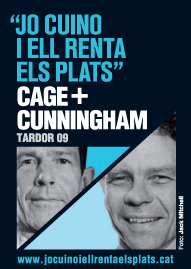Participants
Tony & Ridley Scott’s RSA FIlms and Ag8 (film – U.K.) / Duquende Live (flamenco) / La Carnicería de Rodrigo García (video performance) / psst!3 (animation – USA) / Homage to Merce Cunningham (dance – USA) / Malviviendo (series) / Derivart: El inspector + El manager (multimedia tools) / Original Jazz Orquesta Taller de Músics / Alberto Vázquez-Figueroa (literature) / MolinaPírate (viral action) / Evan Roth (art – Hong Kong) / David O’Reilly (Golden Bear – Denmark) / Rémi Gaillard (actions – France) / EFF (parody – USA) / Riot Cinema Collective (Crowdfunding) / Jamendo – CDG (live) / Shelios + Ciclope + UPM: eclipse 2009 (science and p2p) / Ilegal art: Stay free! (USA) / FreeCinema (USA) / Alqua (thinking) / Xavier Theros (Accidents Polipoetics) / Martín Fernández (MotionGraphics)…
+ Concierto and Live Set Daedelus (Ninja Tunes – USA) + Martin Vallejo
eXponsors
GISS (Global Independent Streaming Support) / Miró Tv (tv online – Democracy Now) (USA) / Telekommunisten (Berlín) / Traficantes de Sueños
PARTICIPANTS DETAILS
Tony & Ridley Scott’s RSA FIlms and Ag8 (film – UK)
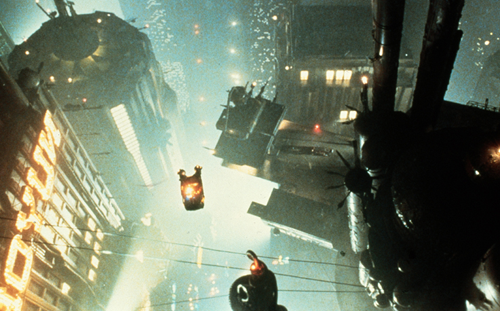
Purefold
Legendary film directors Ridley Scott (Blade Runner, Alien…) and Tony Scott, along with Ridley’s son Luke, have teamed up with independent studio, Ag8 to produce “Purefold”. Purefold is a framework conceived and designed by Ag8 for RSA Films (Ridley Scott Associates), in order to produce an open series of near-future films.
The series will be released under a Creative Commons Attribution-Share Alike 3.0 license and will allow everybody to access material, change existing episodes or even create new ones..
Ridley Scott (1937) is a British film director, three-time nominee for the Best Director category at the Oscars. Scott’s personal style emphasises the viewer’s sensory experience, with lighting, photography, ambience, music and sound synchrony treated almost as “actors” that play a role in creating the overall experience. This characteristic can also be seen in the more than 2000 television advertisements directed by Scott.
The all-round experience offered by Ridley Scott’s early films (in particular The Duelists, Alien and Blade Runner) makes them memorable for more than just the plot or the actors or characters, but also for the atmospheres they bring to life. Ridley Scott was the first to use the concept of the “Director’s Cut” commercially to refer to films reedited by the director and released to audiences in a different version to the original release. Some of his works are already legendry cult films, in particular Blade Runner and Alien. Ridley Scott continues to direct, produce and develop innovative and personal works inside and outside of the mainstream film industry.
Tony Scott was born in Stockton-on-Tees. Following in his brothers footsteps, he studied at the West Hartlepool College of Art and then went on to graduate in Fine Arts from Sunderland Art School. While he initially intended to become a painter, his brother Ridley’s increasingly successful career directing television advertisements made him change his mind and focus on cinema.
In the eighties, producers Don Simpson and Jerry Bruckheimer offered him the chance to direct a film called “Top Gun”. Scott’s visual talents helped to make it one of the biggest box office hits of 1986, earning more than 176 million dollars and turning its young lead, Tom Cruise, into an international star. Following the success of “Top Gun”, Scott found himself on the list of top Hollywood action film directors. In 1987 he joined forces with Simpson and Bruckheimer once more to direct Eddie Murphy in the eagerly awaited sequel “Beverly Hills Cop II”.
Scott’s film “Crimson Tide”, a submarine thriller featuring Gene Hackman and Denzel Washington, was a box office hit in 1995 and confirmed his status as a leading director. He followed this up with “Fan”, a film with an equally impressive cast (Robert De Niro, Wesley Snipes, Ellen Barkin, Benicio del Toro, etc) and has continued to work in feature films, shorts and television with several releases due in the near future.
Juan Cortés Santiago, “Duquende” + The Tallers Singers (flamenco)
Dir. Xevi García
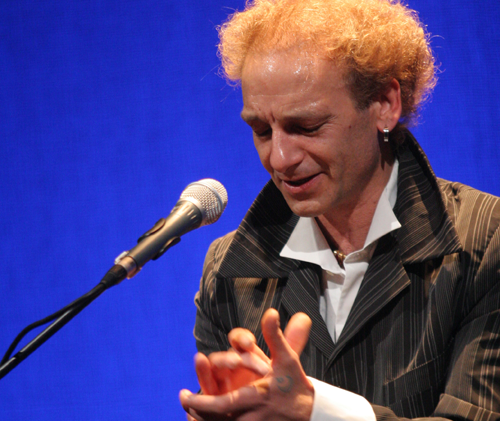
Juan Cortés, Duquende, was born to a gypsy family in Sabadell, Catalonia. When he was eight, the legendary flamenco singer Camarón de la Isla invited him to debut on stage, accompanying him on guitar himself. His performance made such an impact that promoters and record companies tried to sign deals with him, but his parents refused to let him dedicate himself to music professionally at such a young age.
In 1992, Duquende embarked on a brilliant career that has seen him perform in Spain’s major theatres and auditoriums, including the Palau de la Música in Barcelona, the Auditorio Nacional de Música in Madrid, the Palau de la Música de València, the Auditorio de Zaragoza, Auditorio Manuel de Falla in Granada, Teatro Lope de Vega, Teatro Falla de Cádiz, Teatro Central de Sevilla, the Feria Mundial de Flamenco in Sevilla and the Festival de Músiques Contemporànies at l’Auditori in Barcelona.
In 1996 he became the first “cantaor” (flamenco singer) invited to perform at the Theâtre des Champs Élysées, and he has since returned to perform there regularly. In December 1998 he performed with the guitarrist Tomatito. Duquende’s solo debut in the United States took place in 2000, and in 2001 he performed for the first time in Denmark, France and Finland. In the summer of 2002 he performed in Santa Fe, New Mexico, and in New York’s Central Park. This year he is set to continue his international career, with performances planned in France, Germany and on an extensive tour of Belgium.
Many of the great contemporary flamenco guitarists have accompanied Duquende, including Juan Habichuela, Tomatito, Juan Manuel Cañizares, Moraíto Chico and Vicente Amigo. He currently works in close collaboration with José Carlos Gómez and Alfredo Lago. The great Paco Lucía, who Duquende has accompanied as “cantaor” on international tours, has said: “In Barcelona you have one of the greats, Duquende, who has the magic of flamenco “cante”, as well as inspiration and technique”.
Duquende has released five records, including the most recent, Samaruco, with musical direction by Isidro Muñoz and the collaboration of guitarists like Juan Manuel Cañizares and Paco de Lucía. He is currently launching his latest record “Mi forma de Vivir”, produced by ‘Chicuelo’, with the participation of guitarists Niño Josele and Tomatito, trumpeter Rainald Colom, bass player Carles Benavent and percussionist Roger Blavia, among others.
He is also the featured singer in the stage production ‘Camarón, La Leyenda del Tiempo – 30 desprès’, premiered at this year’s Festival Castella de Peralada.
Daedelus (Ninja Tunes – live set – USA)

Alfred Darlington isn’t your average cookie-cutter musician. From how he looks (early Victorian Dandism), to how he makes music, to how he expresses himself and views the world, his is a very individual, a ‘bespoke’ outlook.
“I was born in Santa Monica in 1977 to an artist mother and psychologist father. Musical from very early on, as a child I was classically and jazz-trained in a number of instruments, but my interests were broad and varied – less a prodigy than a renaissance boy whose obsessions ranged from Greek legend to the mountains of Wales. As a 15 year old he finally persuaded my parents to take me to the Principality. Whilst in a YMCA in London I flipped the radio dial, found a pirate radio station and taped some UK rave and hardcore. It was my first ‘Eureka!’ moment in music.”
In 2003, he was booked to play a show in San Diego by Brian Crabtree and Peter Siegerstrong and they asked him to test out an early prototype of the Monome box ( an open source hardware controller). “It’s a Non-traditional electronic instrument,” Daedelus explains. “Basically it allows for massive improvisation.” Since then Daedelus has continued to use this revolutionary box, bringing much genuine liveness to the sometimes static world of performed electronic/dance music.
And while his reputation has grown internationally, his place in the LA scene has also solidified. The musician that many of the hottest names in the city turn to for everything from bass clarinet licks to advice on obscure electronics, Daedelus has worked extensively with Taz from Sa-Ra, the pair of them opening for the likes of DJ Assault, Justice and Two Live Crew as well as appearing in Erykah Badu’s most recent video.
Daedelus is a part of the groups Adventure Time and The Long Lost. He is currently signed to the Ninja Tune label but has released material with a number of labels, including: Plug Research, Mush, Laboratory Instinct, Eastern Developments, Phthalo, Merck, Big Dada, Soul Jazz, Distill, Hefty, Bit Of Heaven, Temporary Whatever, Stones Throw, Alpha Pup, Eat Concrete and Warp. He is also a founding DJ at the internet radio station Dublab.
http://www.myspace.com/daedelusdarling
Martin Vallejo
 Martin Vallejo is an animator and illustrator, ex-member and co-founder of the visuals collective No-Domain. His work live performances and real time graphics have been presented at Sónar in 2004, 2005, and 2006 in Barcelona, as well as the Guadalajara, Sao Paulo and Buenos Aires Tours, where he created live shows for artists like Kid Koala, Edan, Cut Chemist, Digable Planets, Madlib, Prefuse 73, Delasoul, Buck 65, Beans and Lychee Lassy, among others. Since then, he has been showcased at numerous visuals festivals all over Europe, such as Mapping, in Geneva, Switzerland, the Hamburg Digital Festival, Dublab Europe Tour, and Sperm Festival in Prague, among others. He is currently working on the solo project “Juntosotravez” focusing on doing pretty much the same but something totally different.
Martin Vallejo is an animator and illustrator, ex-member and co-founder of the visuals collective No-Domain. His work live performances and real time graphics have been presented at Sónar in 2004, 2005, and 2006 in Barcelona, as well as the Guadalajara, Sao Paulo and Buenos Aires Tours, where he created live shows for artists like Kid Koala, Edan, Cut Chemist, Digable Planets, Madlib, Prefuse 73, Delasoul, Buck 65, Beans and Lychee Lassy, among others. Since then, he has been showcased at numerous visuals festivals all over Europe, such as Mapping, in Geneva, Switzerland, the Hamburg Digital Festival, Dublab Europe Tour, and Sperm Festival in Prague, among others. He is currently working on the solo project “Juntosotravez” focusing on doing pretty much the same but something totally different.
Alberto Vázquez-Figueroa (literature)
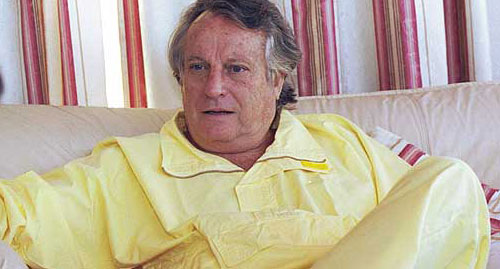
Alberto Vázquez-Figueroa was born in Santa Cruz de Tenerife (Spain) on October 11, 1936. But his family was forced into exile before his first birthday, because his father was a socialist republican jailed during the civil war, and he spent his childhood in “Spanish Africa”. His father was later released, but spent several years in hospital with tuberculosis. His mother died while the family was in Africa, and Vázquez-Figueroa was taken in by his uncle, a civil administrator of the military fort where they lived in Spanish Sahara. His uncle started lending him books, in particular adventure stories by authors like Joseph Conrad, Herman Melville and Jules Verne, which became his favourite genre.
In 1962 he began working as a special correspondent for Destino and as a war correspondent for Barcelona newspaper La Vanguardia. He later made the TV program “A toda plana” for Televisión Española with Miguel de la Quadra-Salcedo y Silva. As correspondent he covered wars and revolutions in Bolivia, Chad, Congo, Guatemala, Guinea and the Dominican Republic, among others.
He wrote his first novel, “Arena y viento”, when he has fourteen (and it was published when he was seventeen), but it was not until he had worked as a journalist for fifteen years that he began earning enough money from his books to dedicate himself to his literary career, which would grow to include over sixty published books. Success came with his 15th or 16th novel, “Ébano”, which deals with the slave trade in Africa. The year after it was published, a film based on the book was released. It was to be the first of more than fifteen. His other well-known works include “Manaos” and “Tuareg”, and Vázquez-Figueroa himself directed a film version of “Manaos”.
In 1987 he wrote an autobiography, which he called “Anaconda” and in 2007 he published his most recent novel “Por mil millones de dolares”, which was launched simultaneously in print form and on his blog, where it could be downloaded free of charge. He also declared his intention to publish his future works in the same way:
“From now on my novels will be published simultaneously in three formats: the “expensive” form known as ‘hard cover’, a paperback version for half the price, and a version downloadable free of charge from the ‘Internet’. And magazines and newspapers will have the right to publish them by instalments like novels in the olden days, except that in this case they will not be obliged to pay me any royalties.
People have suggested I’ve gone mad or I have so much money I don’t know what to do with it, or I want to bankrupt myself and take my publisher with me. None of this is true. I have reflected long and hard on the subject and I’ve reached the conclusion that there are now audiences for all levels of purchasing power, just like anybody can dine at a luxury restaurant, a simple hamburger joint or even a soup kitchen.
The same is the case with most parts of consumer culture, except readers, who have to resign themselves to paying the price set by the publisher who has acquired the exclusive rights for a particular book, or wait years until it is released in paperback. And they certainly won’t ever get it for free. And I believe this is unfair because culture is just as important as food and clothes.”
http://www.vazquezfigueroa.es/ http://vazquezfigueroa.blog.com/
Evan Roth (art – Hong Kong)
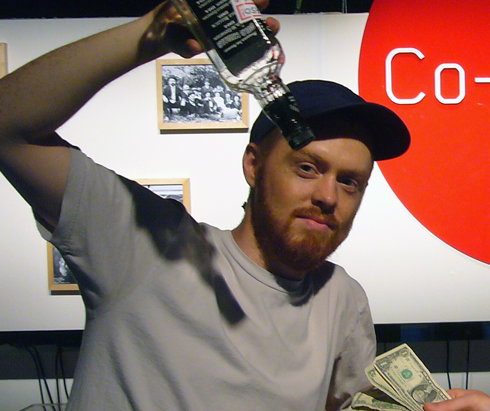
Evan Roth graduated in architecture from the University of Maryland and has an MFA from the Communication, Design and Technology school at Parsons The New School for Design, where he graduated as class valedictorian. During his time at Parsons, he developed several high profile projects, including Graffiti Taxonomy, Typographic Illustration, Explicit Content Only and Graffiti Analysis, his thesis project. Roth was named one of the ten most interesting recent graduates of 2006.
Rodrigo García (videoperformance – Argentina)
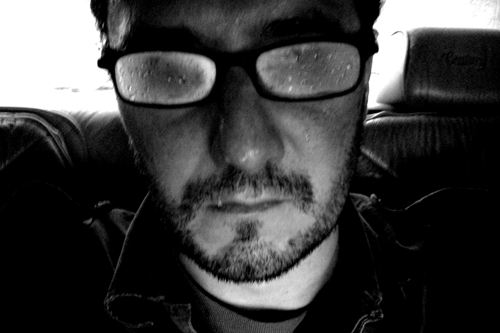 RODRIGO GARCÍA (1964) /La Carnicería Teatro
RODRIGO GARCÍA (1964) /La Carnicería Teatro
More than just “the author of texts that go off like bombs”, Rodrigo García is also a videomaker, performer and stage director. He is recognised and performs anywhere from Avignon and prestigious international festivals to remote corners of the world, and for years he has known how to deal with fame and the siren calls of commercial success.
No ordinary craftsman, his works combine elements from the past with today’s popular culture. With his company, La Carnicería Teatro, he has developed an innovative theatre language in which moving bodies map out the new rituals of everyday life. But his strength lies in being an ordinary man who injects passion into circulating the ideas and feelings that stir a new generation, a generation that rightly values his caustic, intelligent shows.
psst!3 (animación – USA)

PSST!3 is a collaborative film project consisting of 17 films made by 51 teams of Designers, Directors, Animators and Composers.
The mission of PSST is to produce original short films through the collaboration of professionals from different audiovisual disciplines. Each film is comprised of three sections produced by three different teams: the beginning, middle & end. This process is the whole idea behind PSST! – a technique derived from the Dadaist game “Exquisite Corpse” and the children’s game “Telephone” and applied to the arts of motion graphics, animation and film-making.
PSST! is curated and organized by Bran Dougherty-Johnson of Grow Design Work.
Merce Cunningham (dance – USA)

Loops
Merce Cunningham (Centralia, Washington, 1919 – New York, 2009) was a US dancer and choreographer. The grand master and inventor of a unique choreographic technique that became famous around the world and bears his name, Merce Cunningham always paid careful attention to new developments in the arts and technology, and was always a pioneer of all that was new – avant-garde in the literal sense of the word. He was always a precursor.
From 1939 to 1945 Cunningham was a soloist with the Martha Graham Company, and in 1944 he presented his first solo piece in New York with John Cage, who he continued to work with until Cage’s death.
The Merce Cunningham Dance Company was created in the summer of 1953, and Cunningham went on to create more than 200 choreographies, including “Un jour ou deux” (“A Day or Two”), with music by Cage and paintings by Jasper Johns, commissioned by the Paris Opera.
Cunningham’s interest in contemporary technology led him to work with the software “DanceForms”, which he used to create all of his dances from “Trackers” (1991) onwards. In 1997 he began working on movement capture with Paul Kaiser and Shelley Eshkar from Riverbed Media to develop the stage set for his 1999 work BIPED.
In October 2005, Cunningham was awarded the Praemium Imperiale in Tokyo. France named him Commander of its Order of Arts and Letters in 1982 and First Knight (1989) and then Official (2004) of the Legion of Honour.
Now, in 2009, following his recent death, the oXcars pays tribute to him by awarding him the shared culture oXcar for Dance and for a life dedicated to innovation, a field in which he was also a forerunner. The video installation “Loops”, an interactive video-choreography featuring Cunningham’s hands, made by Open Ended Group, was released under a creative commons licence in 2008.
Now, through his clear-sightedness, he has chosen the philosophy of free knowledge to preserve and perpetuate his works. This is why “Loops”, as a choreography and as a digital piece, has been made available through a Creative Commons copyleft licence that allows anybody to reproduce or use it in other works.
Opensource is a kind of living testament that will allow the choreography and the software to be perpetuated and re-created.
From a text by Roberta Bosco published in El Pais
http://www.openendedgroup.com/index.php/artworks/loops-2001-present/
Malviviendo (series)
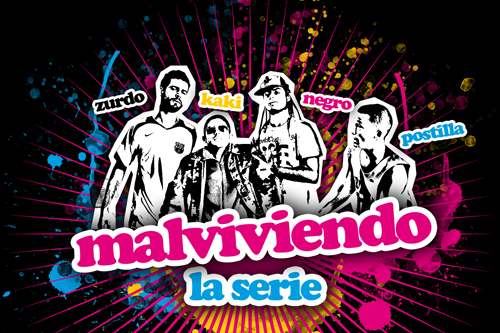
We are a group of young people who have completed our studies and, after a period spent swelling the ranks of the unemployed, have decided take the bull by the horns and create our own series, without a production budget (unless 40 euros for episode one can be called a budget!), with limited technical resources and a lot of imagination.
Hunger sharpens the wit.
The fearsome crisis that has been affecting the audiovisual sector in Spain for several years ends up forcing people to experiment with new formulas, new ways of reaching large audiences who are becoming increasingly choosy and demanding about what they watch, and pay no attention to the people metres.
In this context, where conservatism rules the market, it is particularly difficult for young creators to get ahead This is why Malviviendo wants to think outside the square. We’ve made new technology our ally. The Internet will be our shelter and our travelling companion. With the Internet, we will break barriers and reach anybody who wants to watch us. That simple. Malviviendo is set to become a transgressive, disruptive series, in a class of its own.
It aims to offer innovative content, with ingenious scripts and complex stories from the world around us. Basically, it aims to offer a space for mental dispersion, for not thinking about other things and making fun of a crisis that we are being sold as the apocalypse.
Humbly, but with the vigour of youth, we want Malviviendo to entertain and to convince you.
Derivart (multimedia tools)
El inspector El manager
Derivart explores the intersection between art, technology and finance. Derivart is a Barcelona-based collective consisting of a digital designer (Mar Canet), a plastic artist (Jesús Rodríguez) and a finance sociologist (Daniel Beunza). Their projects include capital market analysis.
And now, right on! Some history-making news: the SGAE repertoire has finally been breached! And the SGAE haven’t exactly made it public. On July 1, at the InnMotion Festival in Barcelona, Derivart launched a closely-guarded secret in a form that is available to everyone. From now on, anybody will be able to choose to only use music that is not registered with the national royalties management association, the SGAE, and stop paying the unmentionable (Spanish digital levy), because we will finally be able to know what exactly is in their power and what isn’t.
For this purpose, we now have two infallible tools:

Firstly, the “Inspector”, a Firefox add-on that checks whether music registered with the SGAE is available on P2P networks. This tool is already available on the Derivart site, where we can download it for home use. Free and legal filesharing, directly from the SGAE website..

And we can also enjoy the “Manager”, a tool that will help you to detect whether there are any songs registered with SGAE in the folders on your computer. If you are considering holding a party with free music, doing cover versions of legendary groups, organising a wedding, a charitable party for a noble cause, or just because you want to, the Manager is the answer.
During the festival the tools were already used by more than a thousand people. And now we can keep doing it from home. Let’s all use them en masse. Between all of us, we’re destroying a monopoly!
Original Jazz Orquesta (OJO) + Taller de Músics
Dir. Vicens Martín

El Taller de Musics has never broken with the tradition of having a Big Band, even though it has gone through different stages, different directors and different concepts over the years.
Many of us remember the exchange between El Taller’s Big Band directed by Ze Eduardo and Tete Montoliu, immortalised on a classic record. Now, in line with the Taller de Músic’s innovative spirit, the Original Jazz Orchestra is working on a repertoire with a personality of its own… a contemporary style based on collaborations from local composers. Musicians such as Joan Albert Amargos and Xavier Maristan, among others, have contributed some of their own work to our repertoire, enabling us to achieve a high level of artistic quality and a highly personal style. All this without forgetting the traditional Big Band repertoire: Glenn Miller, Duke Ellington, count Basie, etc…, are also regulars at our concerts.
Recent performance highlights include concerts at l´Auditori in Barcelona (2001), Mercat de la Música Viva in Vic (2001), SGAE – Tete Montoliu Memorial at Luz de Gas (2001), at Palau Robert (2002), and at the 35the Voll Damm Festival Internacional de Jazz de Barcelona (2004).
The Original Jazz Orquesta is also based on the idea of creating an environment that offers avant-garde artists the resources they need to carry out their work. We could say that this is one of the characteristics of this line-up, because our particular nature is what allows us to play the role of interlocutors that artists are so often looking for. And as we all now, once a dialogue starts, it can quickly lead into unsuspected dimensions.
http://www.tallerdemusics.com/
David Oreilly (Golden Bear – Denmark)

Please say Something
David O’Reilley is known for creating animated short films with a stripped-down aesthetic, in a style has been described by blogger Xeni Jardin as “somewhere between Kubrick, Kaufman and Ketamine.”
“Please Say Somehting” is the story of a stormy relationship between a cat and a mouse in the distant future. The short consists of 23, 25-second episodes that have been made entirely by David O’Reilly on a single computer. The film won the Golden Bear for best short at the 2009 Berlinale.
David O’Reilly created several animation sequences and props for the 2007 film “Son of Rambow”. As well as animation for the “guide” sequences in Hitchhiker’s Guide to the Galaxy, with Shynola.
In the tech world he is known for creating the iPhone concept application, iHologram in 2008.
He created the first video for Irish rock band U2’s single “I’ll Go Crazy If I Don’t Go Crazy Tonight”, which was released on U2.com on July 21, 2009.
Rémi Gaillard (actions – Francia)

The snail + Wars
Rémi Gaillard, born in Montpellier in 1975, is a French comedian who came into the public eye through the videos that he posts on the internet. Inspired by Buster Keaton and Charles Chaplin, he has specialised in burlesque humour and pranks, with an original and humorous approach.
He has also been an impostor in many occasions: for example, he went to the French television program “Des chiffres et des lettres” as part of the audience and pretended to have worked out the correct answer to a complicated mathematical equation (2003). He also snuck into a tennis court during a exhibition match between Yannick Noah and Henri Leconte and even managed to hit a ball meant for Noah and score a point (2001).
Many of his self-starring videos have no dialogue and are accompanied by well-known music. His videos end with the caption “C’est en faisant n’importe quoi qu’on devient n’importe qui” (It is by doing anything that you become anybody”), the slogan that Remi Gaillard yells out every chance he gets.
He believes that “you can make a good video using anything at all”. He records his videos with an ordinary home video camera usually operated by his friend and accomplice Grégory Laffargue. His other videos have been mainly shot by Stéphane Laffargue, Steve Reimonen, Arnaud Albelda and Gérald Gattuso.
MolinaPírate (viral)

In January 2009, punters sick and tired of all the pillaging launched a Grand Twitter Contest.
In 140 characters or less, people were asked to use their ingenuity to demand the resignation of the Spanish Minister for Culture, Cesar Molina, who seemed set on taking the rights to access information away from individuals and give them to multinationals and private companies for free.
On March 19, Fathers day’s (because dads and mums are the pirates), the best slogans submitted where brought together in a video that was circulated virally through the net to make it clear, once and for all, that we don’t want politics that go against the common good for the benefit the few, and that we won’t let them take away the best communication tool of all time, P2P!
The video comes with a guide to terminating contracts with ADSL providers who are prepared to monitor their users. And also a guide for signing up with those who don’t.
https://twitter.com/molinapirate https://xnet-x.net/molinapirate
EFF (parody – USA)

From the Internet to the iPod, technologies are transforming our society and empowering us as speakers, citizens, creators, and consumers. When our freedoms in the networked world come under attack, the Electronic Frontier Foundation (EFF) is the first line of defense. EFF broke new ground when it was founded in 1990 ― well before the Internet was on most people’s radar ― and continues to confront cutting-edge issues defending free speech, privacy, innovation, and consumer rights today. From the beginning, EFF has championed the public interest in every critical battle affecting digital rights.
Blending the expertise of lawyers, policy analysts, activists, and technologists, EFF achieves significant victories on behalf of consumers and the general public. EFF fights for freedom primarily in the courts, bringing and defending lawsuits even when that means taking on the US government or large corporations. By mobilizing more than 50,000 concerned citizens through our Action Center, EFF beats back bad legislation. In addition to advising policymakers, EFF educates the press and public.
For years, it’s been a notoriously popular internet meme to remix the “bunker scene” from the 2004 film “Downfall.” In the original scene, actor Bruno Ganz portrays Adolf Hitler’s ranting breakdown in the final days of the Third Reich. In the hands of internet remixers, the scene’s English-language subtitles have been modified to transform it into commentary on everything from the subprime mortage crisis to breakfast theft. There’ve even been meta-commentaries on the meme itself.
EFF Board Chairman Brad Templeton recently remixed his own version, with Hitler ranting about troubles with DRM and the failure of DMCA takedowns to prevent fair uses.
Unfortunately for Brad, he found in making his parody that creating a fair use like this ― and doing so legally ― is not as easy as it ought to be. As a high profile advocate for digital rights, Brad naturally wants to avoid breaking any laws. And while fair use protects his parody from charges of copyright infringement, he wanted to ensure that he didn’t accidentally violate other laws ― in particular the DMCA’s prohibition on circumventing encryption.
This meant that Brad couldn’t just rip a copy from the his own legally purchased DVD. Instead, just to be safe, he would have to make a copy of the film using the “analog hole,” a form of copying that has been recognized by the courts as legally permissible. But that approach brought multiple headaches, Brad had to buy a European version of the film, which comes with optional subtitles, but this meant hassling with region code restrictions.
The upshot is that Brad was able to create a brilliant parody ― with a nice tip of the hat to EFF’s work protecting fair uses like this one from bogus takedown notices ― but only after weeks of hassling with various technical problems that would make most people throw up their hands in frustration. This is a perfect example of why EFF has been advocating for DMCA exemptions for this sort of activity. No one should have to surmount these sorts of technical barriers just to make use of their legally protected free speech rights!
Riot Cinema Collective (Crowdfunding)

Un proyecto de pelicula de Riot Cinema Collective
El Cosmonauta is a feature film project by Riot Cinema Collective that uses the Internet to raise funding and for collaborative distribution, under Creative Commons licenses.
Because we only make the films that we’d like to watch, and we distribute them in they ways we’d like to watch them.
Jamendo – Compartir Dòna Gustet (live)

Jamendo is the largest free music community working under Creative Commons licences. You can legally download songs and full albums by up and coming bands, free.
On Jamendo, artists let you listen, download and share their music. It’s free, legal and unlimited! Join us!
Campaign in appreciation of all those who download music through jamendo.
That’s right, in response to legislation that aims to punish internet pirates, jamendo wants to reward internet users who download free music…
To punish repeat offenders, HADOPI wants to cut off their Internet connection. Well, jamendo pays them for it! In fact, internet users who have helped jamendo find bars, restaurants and stores interested in becoming free culture nodes by spreading jamendo PRO music will have be rewarded by having their internet connection fee reimbursed.
Jamendo proves that there are many alternative, talented artists who know how to make the most of the opportunities created by the Internet and how to adapt to new remuneration models. Through this initiative, the first fans will be rewarded instead of punished. Don’t forget that bands like Nine Inch Nails have recently shown that distributing music free of charge with free licences is not at odds with commercial success.
Jamendo presents:
Compartir dòna gustet

Compartir Dóna Gustet is a collective process based on different disciplines that engages in research and intervention in favour of popular, free, directly transmitted culture. The project arose from a realisation that there is a strong connection between the ways in which traditional oral cultures work and the new possibilities for free production and distribution that are offered by the Internet and new technologies. One of the bases of the project is the production of a record, ‘Marquet’, that is nourished by the roots of traditional music, filtered through contemporary culture.
Compartir Dona Gustet also extends to many areas of what we understand to be “popular” culture: culture that is open, free of financial transactions and with an emphasis on everyday life. CDG promotes and practices cultural production and distribution through free and open licences. It is “popular” culture because it question the figure of the artist as a totally original author of his or her work, and prefer to see artistic endeavour in a less individualistic way that places more value on collective aspects, community, sharing.
http://compartirdonagustet.net/
Shelios + Ciclope + UPM: eclipse 2009 (science and p2p)
Expedición Shelios 2009

- cortesía SHELIOS®
Shelios is a non-profit scientific-cultural association that exists in order to promote and disseminate scientific expeditions.
In July 2009, a total eclipse of the sun crossed southern China. This was chosen as the site for the Shelios 2009 expedition. Professor Francisco Moreno from the IT faculty at Universidad Politécnica, Madrid, together with a research team from the University of Extremadura, directed an Internet broadcast of the longest eclipse this century (6 minutes in total), using P2P technology.
According to Moreno, in 2007 Sheilos had problems with the streaming of two lunar eclipses and the occultation of Saturn because the server was unable to cope with such a high number of hits.
This time, they were able to use a collaborative 2.0 web with real experimentation and P2P, which in the not-too-distant future will allow an “unlimited audience”, because each client that connects will function as a repeater or Proxy.
http://www.shelios.com/ http://tornasol.datsi.fi.upm.es/ciclope
Ilegal art (USA)
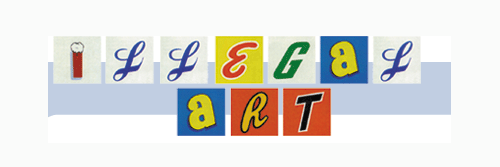
Stay free!
Stay Free! is a nonprofit, Brooklyn-based magazine that explores the politics and perversions of mass media and American (consumer) culture.
The laws governing “intellectual property” have grown so expansive in recent years that artists need legal experts to sort them all out. Borrowing from another artwork – as jazz musicians did in the 1930s and Looney Tunes illustrators did in 1940s – will now land you in court. If the current copyright laws had been in effect back in the day, whole genres such as collage, hiphop, and Pop Art might have never have existed. The Illegal Art show needed an end-user license agreement, so in 2002 Jason Torchinsky wrote this one.which we now present at the oXcars.
FreeCinema (USA)

A filmmaker’s organisation that promotes films made using opensource and free software. For example, “Nothing so Strange” by Brian Flemming, a fake documentary on the murder of Bill Gates, which makes all of its footage freely available.
Alqua
Alqua is a free publishing house that has been in the loop of scientific content creation and dissemination since the year 2000. Alqua wants to liberate existing academic knowledge in book form, and to enable experts to concentrate on their writing. It does so by facilitating collaboration tools, a revision process, a set of style practices and an automated publishing system with high quality layout templates and proper handling of metadata for web publication.
Regarding authorship, Alqua is aligned with standard merit attribution systems and tries to make author contributions and responsibility visible, although it of course builds upon and accepts public domaincontributions.
In order to get the fruits of your work beyond the digital realm, Alqua offers a program to donate free books to public libraries. Several other exciting initiatives, including some exploring the cutting edge of content granularity and interactivity axes are waiting for your enthusiastic participation, either as a domain expert, a free software programmer or an activist for free culture and the right to access knowledge.
Xavier Theros – Accidents Polipoetics
Xavier Theros was born on a sunny spring day in 1963, when barely had the power of speech and didn’t have a single hair on his head. Since then, he has spent more than ten years doing things on the most unlikely stages with Accidents Polipoètics, accompanied by Rafael Metlikovez. The pair have just written the book “Todos tenemos la razón” (”We are all Right”) (published by La Tempestad), in which they delight us with their own special vision of the world and history, with great dollops of humour, absurdity, cantankerousness and a symbolic rear vision mirror from a Seat 600 car.
http://blogdeaccidentspolipoetics.blogspot.com
Martín Fernández (MotionGraphics)
Director. Motion Graphics. Barcelona. www.martinfernandez.tv
***
EXPONSORS
Attitudes that help to make this event possible. The following Companies have offered skills and resources to help make the oXcars a reality. Their Official Representatives will attend the event.
GISS (Global Independent Streaming Support)
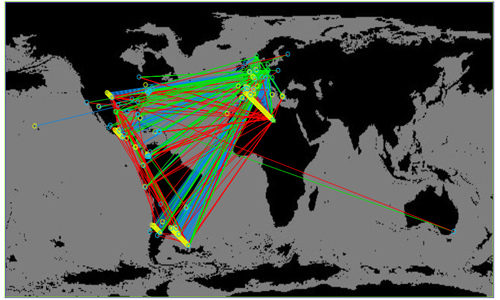
GISS is a network of independent servers that supports streaming (Internet video broadcasting) free of charge, using free software.
Giss is a volunteer, non-commercial project created with free software for free media.
Miró TV (TV online – Democracy Now)
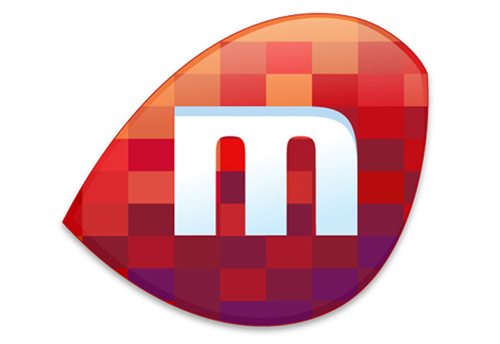
Miro TV: Television 2.0, P2P television
Miro is a free, open source Internet TV distribution platform that incorporates P2P technology. This means that each receiver also transmits information, so that every user contributes to the distribution of the global content. Anybody can create their on television channel on Miro free of charge, making it a powerful tool for the worldwide distribution of independent productions. This open model of producer-consumers is starting to be called Television 2.0, in reference to Web 2.0 and the changes it brought about in the Internet, and it will radically transform the way we watch TV.
Miro currently offers access to over 200 commercial channels and more than 3000 channels run by independent producers, most of them using HD (high definition) technology. It also allows users to customise the application by adding any kind of RSS feed (videopodcast) and to search and view on other platforms (youtube, blip, etc…) Miro development is supported by the Participatory Culture Foundation, a non-profit organisation.
Telekommunisten

Telekommunisten is a German/Canadian Worker’s collective based in Berlin. The collective is involved in the art, hacker/free-software and activist communities, and their work focuses on promoting the ideal of workers’ self-organisation of production as a form of class struggle.
Telekommunisten is controlled by its workers and committed to staying that way. They believe that they can serve their customers best and at the lowest cost by remaining focused on meeting the needs of their workers and customers, not on profits for outside shareholders.
They believe that capitalism and the resulting global dominance of undemocratic corporations are the source of poverty, inequality, war and environmental catastrophe.
They also believe a solution can be found in workers autonomously organizing their own production. Without the theft of the product of labour, the oligarchs would not have the wealth to control corrupt politicians and fund immoral wars.
http://www.telekommunisten.net/
Traficantes de sueños
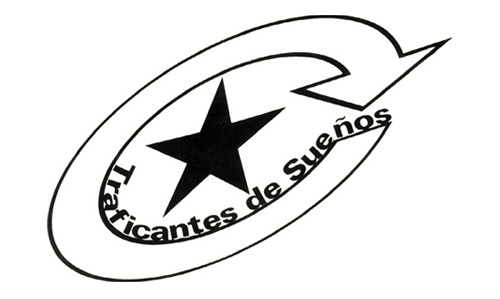
Traficantes de sueños isn’t a publishing house, or even an independent publisher that hopes to publish a constantly updated collection of critical texts.
On the contrary, it’s a project – you could call it a gamble – that aims to chart the constituent lines of other modes of life and to use people’s own words to construct, in theory and practice, the toolbox that can eventually build the cycle of struggles for the coming decades. But to do this without indulging in the archaic “sacredness” of culture, without concessions to the narcissism of literary genius, and without any loyalty at all to the usurpers of knowledge.
TdS embraces free access to knowledge. This means published texts can be partially or fully reproduced in any imaginable format, except where explicitly prohibited by the author of a for-profit edition.
As you know, copyleft makes content free as in freedom, not as in free of charge!
Everything has its costs…
